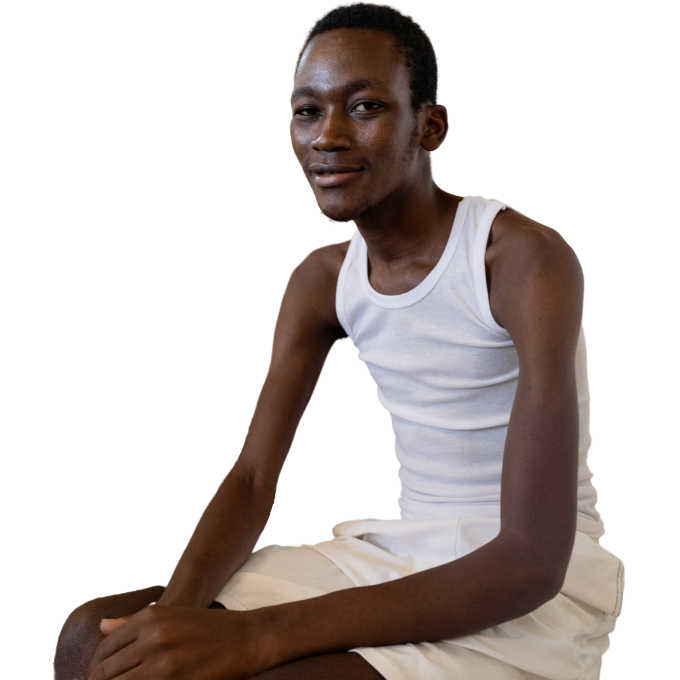“This is the first hospital I’ve been to that has welcomed me like this.”
Your support will help patients like Enoc access dignified care for tuberculosis and other infectious diseases.

Tuberculosis has been eradicated in most parts of the world where people have access to high-quality health care and childhood immunizations. But in places like rural Haiti, it remains disturbingly common. In most cases, TB infects the lungs and leads to debilitating coughs and fever symptoms which grow worse over time. But in rare cases, the TB bacterium infects a patient’s intestinal tract and causes a range of other symptoms. This kind of TB can be hard to diagnose, and patients often wait a long time to get diagnosed and start treatment.
That was the case for Renelson Florestal of Port-au-Prince. He had been suffering from abdominal pain and other GI symptoms before finally getting diagnosed with abdominal TB. Thankfully he was able to get treatment. TB treatments are long and arduous, in many cases nearly as difficult as the illness itself. But Renelson persevered and recovered from TB. However, his journey to health was far from over.
The damage caused by TB and the treatment for it was extensive, especially in Renelson’s esophagus. Several months after finishing his antibiotic treatment, Renelson found he could not swallow easily. Renelson’s mother Renette was frantic to get her son help. She didn’t know what was wrong, and after being sick for so long she was worried about how long he could keep fighting this new challenge.
Renette brought Renelson to hospital after hospital around the city, turned away time and time again due to exorbitant fees, impossibly long lines, or a lack of supplies and equipment. His 16-year-old body, which had already been through so much fighting off tuberculosis, grew smaller and weaker as he struggled to get enough nutrition. One hospital gave them medications to try, but they didn’t make a difference. His throat continued to constrict until he could only swallow liquids.
I thank St. Boniface Hospital for this incomparable service that they provide to the people of Haiti
Renette, Renelson’s mother
“After spending months searching for help for my boy I was very depressed and started to cry because I felt like there was nothing I could do to help him.” None of the hospitals they had visited could help Renelson, and at this point, the boy had been taking in nothing but water and thin broth for three months. He was weak and thin, and so tired.
Then his throat closed so much he could barely swallow water.
“I brought my boy with me to church that Sunday. I was crying during the service, wondering what to do. Then, at the end of the service a man came up to me, and we started talking about Renelson and his troubles. This man told me about a hospital called St. Boniface, in the South. He said we might be able to find help there.
The next morning, Monday, Renette, and Renelson made their way to Fond des Blancs. Renelson had barely ingested anything for over a week. He was dehydrated, and his condition was becoming critical.
As soon as they arrived Renelson was rushed to our new emergency department. “I was so impressed to see how the staff at St. Boniface Hospital took care of my boy right away,” Renette says. “From that moment on I felt comfortable, knowing that my boy would be healed.” The difference from her experiences at the other hospitals they had been to was striking, and life-changing for Renelson, who was finally getting the care he desperately needed.
Our surgical team, led by Dr. Luther Ward, quickly got involved in Renelson’s case. “X-rays showed that nothing was passing down Renelson’s esophagus past his mid-chest, and was not able to get into his digestive system,” Dr. Ward explains. “This had been the case for nine days, so he had a fairly emergent situation.”
Before surgery, x-rays showed that fluid couldn’t pass beyond the scar tissue in Renelson’s throat.
After surgery, liquid could flow into Renelson’s stomach again.
The team diagnosed that scar tissue from the tuberculosis infection and treatment had built up and effectively closed off Renelson’s esophagus. He was quickly prepped for major surgery to repair the damage and make it possible for him to eat again. “This surgery consisted of opening up both his abdomen and chest and removing the damaged part of his esophagus. This is a difficult surgery, technically, because you have to separate the esophagus from surrounding organs like the heart and lungs. Then we replaced the damaged esophagus with part of his stomach.”
Our robust surgical program and fully-equipped surgical center (built with the support of USAID/ASHA and the generosity of the American people) made it possible to do this complex surgery on a short timeline. Dr. Ward explains, “this case was only possible because of years spent building up anesthesia personnel, strong surgical nursing staff, and having a chief resident (trained in Haiti at SBH and PIH’s University Hospital in Mirebalais), whose training surpasses most residents in the world. It’s a team that finds solutions instead of saying ‘we can’t.’”
After his surgery, Renelson’s follow-up x-rays showed that fluid can now get into his stomach, and pass all the way through his digestive system once more. That means that after months of suffering, and being near death, Renelson can finally eat again. He is on the path to health once more, after a very long journey through illness.
Your support will help patients like Enoc access dignified care for tuberculosis and other infectious diseases.
